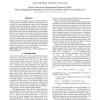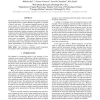84
Voted
INTERSPEECH
2010
14 years 9 months ago
2010
We propose a delexicalization algorithm that renders the lexical content of an utterance unintelligible, while preserving important acoustic prosodic cues, as well as naturalness ...
108
Voted
INTERSPEECH
2010
14 years 9 months ago
2010
In this paper, we propose a novel speaker adaptation technique, regularized-MLLR, for Computer Assisted Language Learning (CALL) systems. This method uses a linear combination of ...
148
Voted
INTERSPEECH
2010
14 years 9 months ago
2010
Practical supervised learning scenarios involving subjectively evaluated data have multiple evaluators, each giving their noisy version of the hidden ground truth. Majority logic ...
118
click to vote
INTERSPEECH
2010
14 years 9 months ago
2010
In this paper we describe a system that separates signals by comparing the interaural time delays (ITDs) of their timefrequency components to a fixed threshold ITD. While in previ...
INTERSPEECH
2010
14 years 9 months ago
2010
In this paper we describe our efforts to build a Mandarin Chinese voice search system. We describe our strategies for data collection, language, lexicon and acoustic modeling, as ...
54
Voted
INTERSPEECH
2010
14 years 9 months ago
2010
117
Voted
INTERSPEECH
2010
14 years 9 months ago
2010
This paper proposes a new phase vocoder based method for shape invariant real-time modification of speech signals. The performance of the method with respect voiced and unvoiced s...
111
click to vote
INTERSPEECH
2010
14 years 9 months ago
2010
Supervised methods for extractive speech summarization require a large training set. Summary annotation is often expensive and time consuming. In this paper, we exploit semisuperv...
128
Voted
INTERSPEECH
2010
14 years 9 months ago
2010
In missing feature based automatic speech recognition (ASR), the role of the spectro-temporal mask in providing an accurate description of the relationship between target speech a...
133
Voted
INTERSPEECH
2010
14 years 9 months ago
2010
Vocabulary restrictions in large vocabulary continuous speech recognition (LVCSR) systems mean that out-of-vocabulary (OOV) words are lost in the output. However, OOV words tend t...




